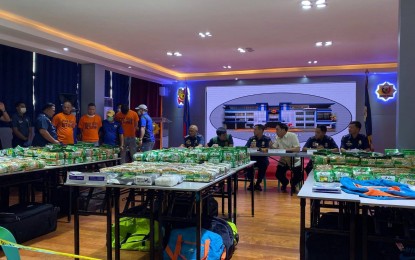
DEATH TO DRUG TRAFFICKERS. Officials of ICAD member agencies present PHP2.6 billion worth of shabu and three suspects arrested in separate operations in a press briefing at the PNP Crime Laboratory on Thursday (Nov. 28, 2019). The ICAD member agencies reiterated their call for the reimposition of the death penalty, particularly for drug trafficking cases. (PNA photo by Lloyd Caliwan)
MANILA -- Member agencies of the Inter-Agency Committee on Anti-Illegal Drugs (ICAD) on Thursday reiterated the call for the reinstatement of the death penalty for illegal drug traffickers in the country.
Philippine National Police (PNP) officer-in-charge, Lt. Gen. Archie Gamboa, Dangerous Drugs Board (DDB) Chairman Catalino Cuy, and Philippine Drug Enforcement Agency (PDEA) Deputy Director-General Greg Pimentel made the call during the presentation to media of the PH 2.6 billion worth of shabu seized from three suspects, including a Chinese national, arrested in separate operations this week.
The officials also said they are now much more in favor of the death penalty on grave illegal drug involvement as the drug haul indicates that the drug syndicates are fearless in pushing through with their illegal activities.
"Death penalty is important (because without it), they can just enhance their business. They get to have a meeting with all those personalities who are involved in this trade in prison kasi nandun sila lahat [because all of them are there]," Gamboa said.
Former PNP chiefs Oscar Albayalde and Ronald "Bato" dela Rosa both earlier called for the revival of the death penalty.
“This is the main reason for the imposition of the death penalty. We are very thankful we found an ally in the senate through, of course, Senator Bato is there and I think he has the same stand,” Gamboa said.
Cuy, meanwhile, said the absence of death penalty is an incentive for criminal elements, particularly, drug peddlers.
"Parang ease (it's like an ease) of doing business ito sa kanila (for them) that's why they are here," Cuy said.
Without the death penalty, the drug suspects are still getting financial gains, Cuy pointed out.
"I understand maliit lang yung capital, paggawa nyan but kita mo naman market price nila dyan how much yung kanilang pera makukuha nila [I understand that there is a small capital on manufacturing illegal drugs but they could gain as you see the market price," Cuy said.
Pimentel, on the other hand, said high-value drug suspects could end up at the New Bilibid Prison (NBP) and build networks to enhance their drug trade.
"So this gives them a chance to reunite and reconnect with other drug personalities and when they get out it will be a bigger problem," Pimentel said.
In June 2006, former President Gloria Macapagal-Arroyo signed Republic Act 9346 which abolished the death penalty in the country.
Some countries that impose the death penalty as the harshest punishment for drug offenses are China and Indonesia.
In 2011, three overseas Filipino workers (OFWs) were executed in China for drug smuggling through lethal injection, despite appeals from the Philippine government.
In 2010, another OFW, Mary Jane Veloso was arrested for carrying heroin in a suitcase in Indonesia.
Her execution set in April 2015 was halted after Jakarta heeded Manila's plea to let her testify in the case against her recruiters. (PNA)
